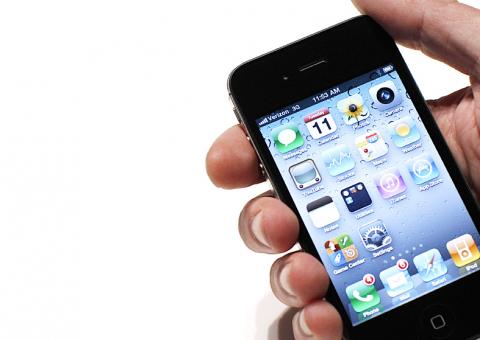Apple has surpassed Finland’s Nokia to become the world’s largest handset vendor in revenue terms, a technology research company said on Thursday.
Strategy Analytics said Apple overtook Nokia for the first time in the first quarter with an iPhone revenue estimated at US$11.9 billion on sales of 18.6 million units.
Nokia revenue was estimated at US$9.4 billion for the period. The Finnish company remains No. 1 overall in terms of units sold, selling 108.5 million handsets in the first quarter, but for cheaper prices than the iPhone.

Photo: Reuters
“With strong volumes and high wholesale prices, [Apple] has successfully captured revenue leadership of the total handset market in less than four years,” Alex Spektor of Strategy Analytics said.
“In revenue terms, Apple is now the world’s largest handset vendor, smartphone vendor and tablet vendor,” added Neil Mawston, director at Boston-based Strategy Analytics.
Strategy Analytics also said that it expects that the number of smartphones running Google’s Android software to surpass the iPhone by the end of the year.
Reporting its fiscal second-quarter results on Wednesday, Apple said it nearly doubled its quarterly net profit on record iPhone sales.
The Cupertino, California-based gadget maker said it sold 18.65 million iPhones during the quarter, up 113 percent from a year ago and helped by the addition of a second US carrier, Verizon.
Separately, Samsung Electronics said yesterday it has filed a lawsuit against Apple alleging patent infringements, days after the US technology firm took the South Korean company to court on similar grounds.
Samsung said it filed suit on Thursday in a Seoul court alleging five patent infringements by Apple. Separate suits were filed in Tokyo citing two patent infringements and in the German city of Mannheim citing three.
“Samsung is responding actively to the legal action taken against us in order to protect our intellectual property and to ensure our continued innovation and growth in the mobile communications business,” the company said in a statement that gave no details of the alleged infringements.
The announcement came a week after Apple filed suit against Samsung in San Francisco claiming that the South Korean giant copied its smartphones and tablet computers.
Apple’s lawsuit says Samsung’s mobile phones and Galaxy Tab imitated the iPhone and the iPad. Samsung vowed at the time to “respond actively.”

IN THE AIR: While most companies said they were committed to North American operations, some added that production and costs would depend on the outcome of a US trade probe Leading local contract electronics makers Wistron Corp (緯創), Quanta Computer Inc (廣達), Inventec Corp (英業達) and Compal Electronics Inc (仁寶) are to maintain their North American expansion plans, despite Washington’s 20 percent tariff on Taiwanese goods. Wistron said it has long maintained a presence in the US, while distributing production across Taiwan, North America, Southeast Asia and Europe. The company is in talks with customers to align capacity with their site preferences, a company official told the Taipei Times by telephone on Friday. The company is still in talks with clients over who would bear the tariff costs, with the outcome pending further

A proposed 100 percent tariff on chip imports announced by US President Donald Trump could shift more of Taiwan’s semiconductor production overseas, a Taiwan Institute of Economic Research (TIER) researcher said yesterday. Trump’s tariff policy will accelerate the global semiconductor industry’s pace to establish roots in the US, leading to higher supply chain costs and ultimately raising prices of consumer electronics and creating uncertainty for future market demand, Arisa Liu (劉佩真) at the institute’s Taiwan Industry Economics Database said in a telephone interview. Trump’s move signals his intention to "restore the glory of the US semiconductor industry," Liu noted, saying that

NEGOTIATIONS: Semiconductors play an outsized role in Taiwan’s industrial and economic development and are a major driver of the Taiwan-US trade imbalance With US President Donald Trump threatening to impose tariffs on semiconductors, Taiwan is expected to face a significant challenge, as information and communications technology (ICT) products account for more than 70 percent of its exports to the US, Chung-Hua Institution for Economic Research (CIER, 中華經濟研究院) president Lien Hsien-ming (連賢明) said on Friday. Compared with other countries, semiconductors play a disproportionately large role in Taiwan’s industrial and economic development, Lien said. As the sixth-largest contributor to the US trade deficit, Taiwan recorded a US$73.9 billion trade surplus with the US last year — up from US$47.8 billion in 2023 — driven by strong

STILL UNCLEAR: Several aspects of the policy still need to be clarified, such as whether the exemptions would expand to related products, PwC Taiwan warned The TAIEX surged yesterday, led by gains in Taiwan Semiconductor Manufacturing Co (TSMC, 台積電), after US President Donald Trump announced a sweeping 100 percent tariff on imported semiconductors — while exempting companies operating or building plants in the US, which includes TSMC. The benchmark index jumped 556.41 points, or 2.37 percent, to close at 24,003.77, breaching the 24,000-point level and hitting its highest close this year, Taiwan Stock Exchange (TWSE) data showed. TSMC rose NT$55, or 4.89 percent, to close at a record NT$1,180, as the company is already investing heavily in a multibillion-dollar plant in Arizona that led investors to assume